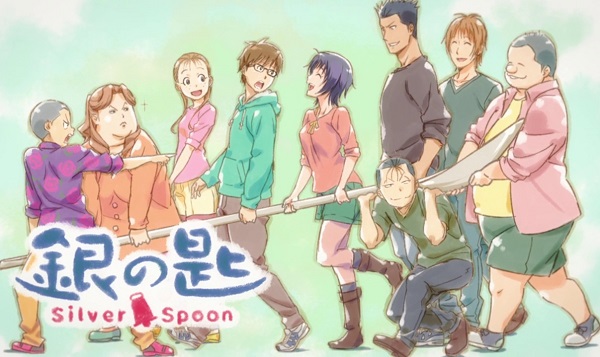
Even though I’ve watched both seasons of Silver Spoon (Gin no Saji) I didn’t include either in my seasonal anime reviews because I wanted to write about the series in a way that would require it to have its own post. I didn’t feel like giving it a standard review because it has particular themes I want to go into depth about, much like I did with my post about ambiguity in Nisemonogatari. The reason I wanted to do this with Silver Spoon is because it deals with a subject matter I’m very interested in – how animals are treated in the farming industry…
I’ve mentioned a few times on the blog before that animal welfare is another hobby of mine. Actually, that’s one of the reasons I decided to watch Silver Spoon. As I watched the first season, there were a lot of animal issues that came up that I wanted to talk about, so I thought, “Rather than just review it, I’ll give it its own specialized post when it finishes airing.” But then when I found out it was going to have a second season in winter of 2014, I figured, “Ok, I’ll wait on that post until after the second season airs so I can discuss the series in full” (actually, there were surprisingly less animal-related themes in the second season compared to the first XD) I decided to write this post in the same way I did with my “series of mini reflections” post for OreImou back in 2010: I picked a handful of topics from the 22 episodes that stood out to me in terms of animal welfare and wrote a paragraph about each.
– The dilemma of horseback riding
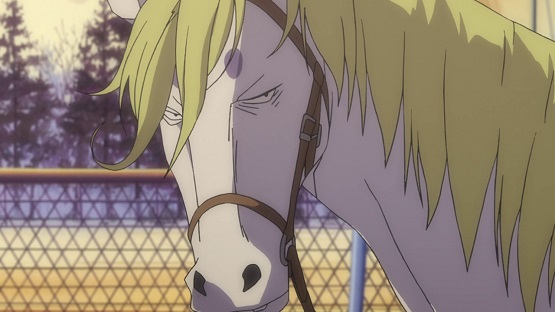
One of the first things Hachiken does after starting at the agricultural high school is join the equestrian club to ride and take care of horses. Horses are one of the luckier farm animals because they’re not strictly bred to be killed for food, but to be ridden, and often adored, by people. Horseback riding is sort of a grey area in terms of animal welfare, with some people believing it’s cruel and others not. The reason people say it’s cruel is because the horse spends all its life with an uncomfortable bit in its mouth being yanked around and manipulated by humans riders or being made to carry painfully heavy loads, before being shoved away in a stable to stand around rather than run free. But on the other hand, if it gets enough exercise being ridden often and is well taken care of in the process, perhaps a bit of discomfort is a small price to pay for the horse to live a life free of predators and having to get food on its own. This makes me think of a quote by C.W. Anderson: “Many people have sighed for the ‘good old days’ and regretted the ‘passing of the horse,’ but today, when only those who like horses own them, it is a far better time for horses.” But this leads to my next point…
– Horses in competition
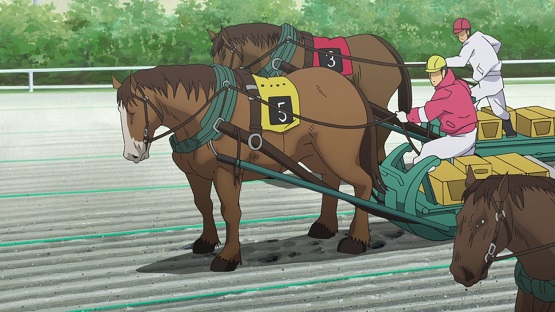
I don’t see anything wrong with casual horseback riding, where people have horses because they love riding them and sharing a bond. The laid back competition Hachiken and Mikage participated in in episode 4 of season 2 was fine as no horses’ lives were on the line. But things get significantly less nice for the horses when riding them becomes a large-scale business, especially if money is involved. A few episodes of Silver Spoon deal with Ban’ei horse racing, with the characters even participating in such a race themselves for the school festival. When he first sees a Ban ‘ei race, Haciken learns that, sometimes, if a horse doesn’t win, it will get sent to slaughter. Hachiken remembers this several times in the series and relates it back to himself – the idea that if someone just fails once, that’s it, they can never stop being condemned a failure. I don’t think money is involved in Ban ‘ei racing, but even so, it’s a case of horses being brought into the world by humans for a specific task, and if they don’t do well at it they’re disposed of, rather than simply being enjoyed for what they can offer. Things are even worse in real horse racing when money is at stake. I know they’re plenty of jockeys who love their horses, but a lot of the time money is more important than the well being of the horse, with horses often getting seriously injured in races and killed off if they can’t win anymore. People can run fast too so why can’t people just bet on other people for money in races and leave the horses out of it?
– Quality of life until death
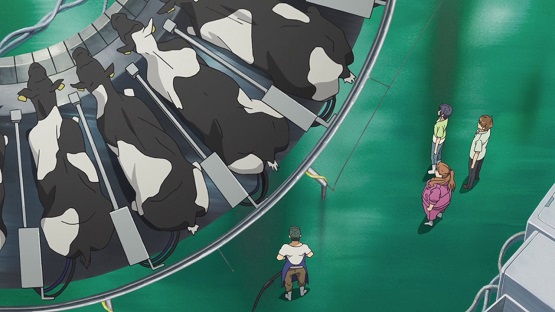
In episode 7 of season 1, Hachiken and Mikage pay a visit to Tamako’s large, modern farm where, even more so, animals are viewed as nothing more than the gains they produce, and if they can’t adequately produce, they’re of no more use and sold to slaughter. While we don’t see too much detail about how Giga Farm is run, it’s obvious that the well being of the animals is not really considered, as is the case with pretty much all industrial “factory” farms in real life. When it comes to a small, homely, old-style farm like Mikage’s versus a high-tech, and rather “cold” one like Tamako’s, in both cases animals are eventually killed for food, but in the former case, the animals lead a better life overall, with the farmers actually caring about them. It would be even better if the cows were able to roam and graze freely rather than be forever confined to a barn, but that’s still better than the other option. I’ve always believed that quality of life is much more important than “lack of killing” when it comes to animals, in other words, if an animal leads a good life up until the day it’s killed for food (as painlessly as possible), that’s much better than an animal leading a miserable life, even though both eventually lead to the animal’s death for human gain. Animals don’t know what death is until it actually happens to them, unlike humans who can suffer just by anticipating it long before it’ll happen to them. So for animals who live in the moment, I suppose it’s not so bad if they’re brought into the world to be killed as long as the time up to their death is spent in relative comfort. But sadly that’s not the case for the animals at Tamako’s farm and many like it.
– Eating wild animals
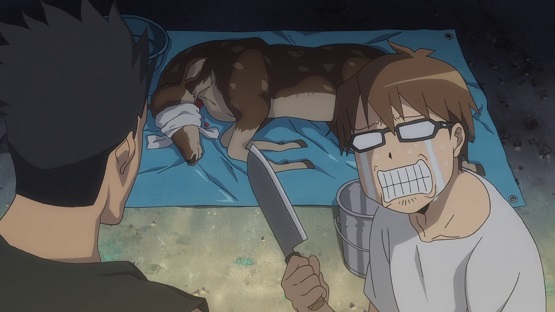
During Hachiken’s stay with the Mikages for part-time work, he tries to conquer his own inner inhibitions by cutting up a deer for them that the father hit with his truck while driving, despite being squeamish about it. This brought up the idea of whether people should eat wild animals for food. In a way, the deer may have been better off than most of the farm animals – it lived a natural life up until the moment it died being hit by the car, which was a swift death. The Mikages are obviously barely getting by financially and mostly live off the land, so it’s good that they didn’t waste the deer’s death. In a way, the father speeding around in his truck like that and hitting animals is perhaps his way of hunting them. Speaking of hunting, Marina over on Anime B&B also wrote a post about Silver Spoon, and comments came up in the post (mine among them XD) about whether hunting is just as cruel as eating animals who lived horrible lives at factory farms. I agree that it’s less cruel in cases similar to the one with the deer in Silver Spoon – where the animal lives a fine life in the wild until it’s killed swiftly to feed people (and even clothe them if they use the pelt). I would support hunting if all hunters hunted in that way for that reason, but they don’t. Too often they hunt just for fun, not to eat the animal but to make a trophy out of it, or because they don’t like certain animals roaming on their land, or something selfish like that. Plus it frequently happens that animals don’t die from one shot and they get away, having to die a slow, painful death from a bullet wound. But mostly people hunt because they enjoy it; they like inflicting pain and death on other creatures and they don’t care what their victim suffers, and that’s what I can’t stand – it’s promoting a blatant disregard for life and the feelings of other creatures as a sport, rather than its fundamental purpose as an alternate way of survival. And the series tried to pass it off as comical when the dad ended up hitting and killing a bear at the end of the episode, but all I could think of was “What if that was a mother bear? Now her cubs are going to suffer and die.”
– Putting out the dog
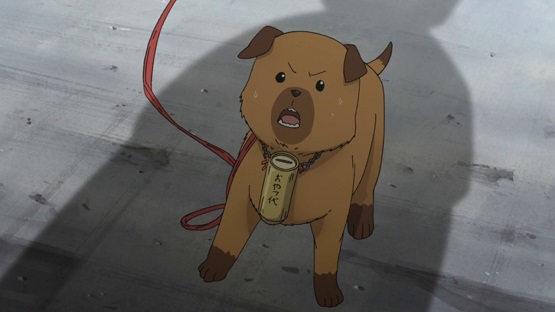
In episode 2 of Silver Spoon’s second season, Hachiken adopts a puppy, oddly named Vice President, that he keeps in a dog house on the school grounds throughout the rest of the series. For some reason it made me kinda sad that Vice Prez spent just about all his time tied to a nearby pole, never being able to roam more than a few feet from the dog house. Dogs are pack animals and get anxious when they’re left alone, so it must have been stressful for Vice Prez to see all his friends walking by and never being able to follow them. We do see that Hachiken takes him for walks sometimes, so that’s fine…it’s understandable since he’s a puppy, as it would be dangerous for a little inexperienced animal to run around a farm where he could get stepped on by bigger animals. But what about when it gets really cold or hot outside? I remember one episode where it was snowing and he was still outside with snow on him! If I knew someone who left their dog outside all night when it was snowing, I wouldn’t stand for that! They should at least make an exception for bad weather and have someone keep him at their home that night. Oh well. Maybe they can let him roam free when he gets older, bigger, and more obedient.
– Respecting the life you consume
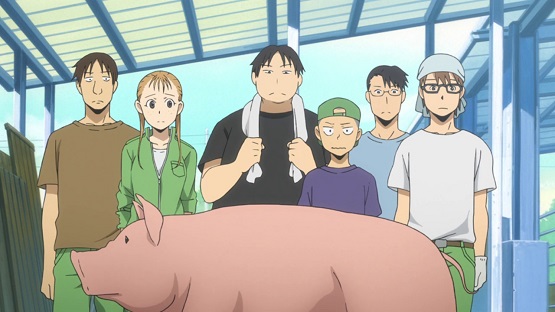
The overarching conflict of Silver Spoon’s first season is how Hachiken forms a bond with the pig Pork Bowl and how he has to come to grips with the fact that Pork Bowl is eventually going to be sent to slaughter when he gets big enough. While no one else seemed to care about the runty piglet, Hachiken took it upon himself to give Pork Bowl the best of care, and even some affection on the side, despite knowing that it’ll only make things more painful when the day for slaughter comes. The situation with Pork Bowl goes back to what I discussed above about how quality of life is what’s most important for animals. Looking back on it, Pork Bowl did have a pretty good life: he might not have been able to roam the fields and take mud baths like a pig should, but he was at least able to walk around his pen (unlike the cows and chickens at the school, who sadly seemed even more confined), get consistent feeding, be in a safe environment, and even get a little love. We don’t see what happens to him after he’s taken away to slaughter (likely it’s a painful death if it’s anything like real slaughterhouses) but again, his quality of life was not too bad and that counts much more than simply the fact that he had to die. And even after Pork Bowl died, Hachiken made sure that his death would never be forgotten by making delicious bacon out of his meat and sharing it with his friends and family. If all animals bred for food were treated with the respect Hachiken had for Pork Bowl, I can’t help but think it would be a more pleasant world overall. If human beings have the ability to accurately send their own kind to the moon and back, and build super computers that can send wells of information from here to eternity in a second’s time, they should be able to develop a method where the billions of animals bred for food can live good lives and be killed painlessly, and still be able to feed billions of people. That’s one of my hopes for the future anyway ;)
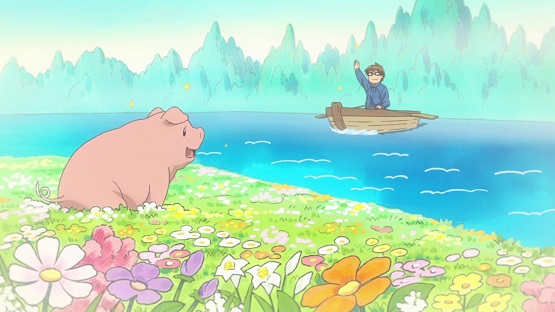
*screencaps credited to Random Curiosity*
Interesting points that you bring up in this post. I see where you are coming from with your post and while I don’t disagree with some of the notions you made, being from a small semi-rural town with both farming and hunting lands I don’t necessarily agree with your perception of how people view their treatment of animals. I don’t claim to know the ins and outs of these things as I’m not a farmer it hunter but people I knew who were had the utmost respect for their animals and kept them out on their land and only confined them in barns when the weather was bad. As for the hunting, the area I lived in would get overpopulated with deer as they had very few predators there. So some seasons its quite necessary to get their numbers down. Granted I can’t speak for other people I didn’t know who hunted there so you may be right about the mindset they have for hunting animals.
As for the show, I haven’t gotten around to watching it yet but as with most things, I would just take it as just that, a show, and not necessarily think its promoting a view of how animals should or shouldn’t be treated. As I understand it, its supposed to be somewhat based of off Hiromi Arakawa’s experiences growing up on a farm. So I think that is just what was normal for her in her early life.
Anyway, just posting the little second hand knowledge I have of this! Not trying to start anything or what have you. :)
I definitely don’t think that everyone who keeps animals for profit and puts them in barns is being cruel. As you said, if they’re kept inside the barns for their own safety and aren’t kept in horrible conditions where they’re cramped together, have to stand in their own feces, and can never stretch their limbs, then I’m okay with that. I’ve seen a lot of video footage of farmers (old country-type farms, not factory farms) from different parts of the world who take their animals out to graze, bring them inside when needed, and basically give them nice lives, which is great =)
Certain animal species overpopulating is a reason people use to justify hunting, but that doesn’t mean it’s not cruel since we know a bullet wound in your body is not a nice way to go. It’s funny that the same people who would say mass killing is an acceptable way to deal with deer overpopulation don’t even acknowledge the dangers of human overpopulation. There’s gotta be a less cruel way to deal with such a problem..and there is as I’ve read about development of sterilization methods where they can inject animals like deer with something that will make them sterile and unable to reproduce. But even if such a method became easily available, I’m sure pretty much all the hunters would reject it because, again, most of them hunt because they enjoy killing animals and not because they’re concerned about the animals’ population.
Heh, don’t worry, I know you’re not trying to start an argument or anything XD I had to tread carefully with this post as it’s a touchy subject and I didn’t want to come off as too preachy (I can do that elsewhere but not on an anime blog at least). You just shared your own knowledge in a civilized way and I’m totally cool with that~
Maybe you could had waited for a possible season 3 before
writing this.
One thing I like about the series is Hachiken’s characwqter development. In the first series, being a greenhorn to the agriculture scene, you can see the pity and sympathy, but also his love to the farm animals, even giving them names (not sure about his naming sense of naming his pig Pork Bowl though xD). What’s even better is that in season 2, he is already well aware of their fate, yet he bestow upon them even more intensifying love. Perhaps it’s because he was well aware of their cruel fate that he understood how inportant it is to give them a good quality life, which ties in to one of the points you made. Hachiken’s views aren’t necessarily correct though, but I feel it’s one of the sentiment shared by some livestock farmers.
I didn’t hear anything about a season 3…that would be nice if it happens but I did get a feeling of closure at the end of season 2, at least for now.
Hachiken does go through some great character development, not just in how he treats the animals but how he interacts with all of his classmates, i.e., taking responsibility and helping others as opposed to being apathetic and kind of socially awkward like he was at the beginning. I actually didn’t like him much when the series started but I like him now, so there’s a sign of good character growth =)
About the season 3, I was actually supposed to add a “xD” emoticon as a joke, but ehh, I blame #smartphoneblogging.
LOL, no problem XD That’s why I don’t type out anything longer than a Twitter tweet on my smartphone. It’s just too hard to type accurately on those things =P
I remember that episode where the puppy was still outside by his dog house when it was snowing and I had the same thought – can’t somebody bring him inside??
And I loved that scene where Hachiken dies and goes to heaven and Butadon is there waiting for him! XD
As to your main point, I think everyone has their own definition of animal cruelty and what constitutes it, and the definitions vary wildly. What was so good about Silver Spoon was that it really made you think about these issues but not in a judgmental, preachy way. Hiromu Arakawa was raised on a dairy farm after all, so I doubt she’s a vegan. =D
I totally agree that Silver Spoon portrayed the animal issues in a kind of “greyish” way, not really advocating one side or the other, or showing that one side is all bad or all good. It just presented the reality of things and how each of the characters dealt with it, allowing the viewer to observe and ponder about it for themselves, which was cool.
I too highly doubt Arakawa is a vegan, or even a vegetarian. But despite being raised on a dairy farm, the fact that she can see the good and bad in both sides of the agricultural world (the animals’ side and the people’s side) and present each in a non-extreme way was, again, pretty cool ;)
Good write up. I actually think the show was very “mild” in how it described the treatment of farm animals. It shows everything as being very clean, and nice. Things are not that nice in reality. I worked for a little while in a small miking farm, and a pig farm. While we tried to keep the animals clean to avoid pests, it’s still pretty bad. And they are confined 24/7 in that environment, so it’s not just the little we see in the anime. And the stuff they eat… Man… I’m just glad I was not born a farm animal…
Going back to the anime, while I like your analysis, I think the anime is just trying to give us a little information of what happens in the farms to used as a plot device for the story, and not really attempting to educate people, or build a lot of awareness on what happens. I agree people should learn more about it, and have more awareness, but it was not the purpose of the show at all.
I do agree with you. I agree that quality of life is very important for any animal (including humans), and even if the end is just a quick death, it would be a lot better with good quality of life. But it’s very hard… In the pig farm I worked with (as an extra hand), there were only 2 people permanently working there for about 50 animals. They do not really have time to dedicate to the animals. There is just too much work, and the owners do not see this as a priority, so the minimal staff is kept to maintain the animals in good/healthy condition. The farm was in a pretty enclosed space as well to save money as well. So it’s really hard in reality to try to sell that point (quality of life), because there is very little return for investment for it. I think we could discuss this for hours though. Bottom line, I totally agree with you, but in practice, that may be close to impossible.
Yeah, Silver Spoon was indeed very mild with showing the details of how horrible animals in modern farms are treated, But again, it took place out in the countryside where old-style farms like Mikage’s still exist and obviously don’t treat their animals too terrible. Even so, if it had shown a lot of gory details of slaughterhouses, nobody would want to watch it XD
Thanks for sharing your first-hand knowledge on the subject =) I agree that it does seem impossible to give all of the billions of animals bred for food a good life. It seems like any one farm would have to hire hundreds of workers to take proper care of all those animals and none of them are going to spend the money for that when the only thing they’ll get out of it is being a more humane farm. But as I said, I don’t think it’s impossible with the kind of amazing technology humans have already achieved. If people can make spaceships and super computers, I don’t think making some kind of large scale machine to humanely kill many animals at once is too impossible. They haven’t funded such a thing yet because for years people were never aware of how bad farming conditions are, and many people don’t think it’s important because it doesn’t concern human wants/needs. But these things are slowly changing so I don’t think it’s an impossibility for the future ;)
Oh. my god. These comments are fucking wild. Alright kids y’all need a sit down and hear the same truth cause this shit really got me mad. This is coming from someone who was raised in the farming business. The fact of the matter is that it’s NOT okay for an animal to be slaughtered DECADES before their time so long as their lives weren’t completely terrible. No human can know what they want or how they feel but what we do know for certain is that NO animal wants to die, they make it clear enough with their painful cries when the time comes. They are not objects, they are living, breathing, conscious beings like us. If you’re going to say that animal welfare is a concern of yours, the least you could do is stop justifying their deaths. Read up on the impact of animal agriculture on our health, planet and the animals themselves and try saying “billions of animals bred for food can live good lives and be killed painlessly, and still be able to feed billions of people. That’s one of my hopes for the future anyway ;)” again. And here’s a sneak peek: it’s precisely because of the animals being harvested for food that millions of people around the world are dying of starvation. So long as people continue to lie to themselves that animal agriculture holds any worth, you can kiss that dream goodbye. I know after 15 years I’d had my fair share. Be honest with yourselves.
P.S there’s no such thing as humane slaughter in farming love. It’s too expensive and no one can be bothered.